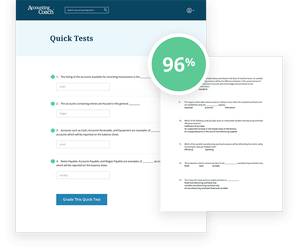For multiple-choice and true/false questions, simply press or click on what you think is the correct answer. For fill-in-the-blank questions, press or click on the blank space provided.
If you have difficulty answering the following questions, read our In-Depth Explanation for this topic.
Balance Sheet
Income Statement
Statement Of Cash Flows
Balance Sheet
Income Statement
Statement Of Cash Flows
Cash Is Received
Services Or Goods Have Been Delivered
Cash Is Paid
An Expense Matches The Revenues Or Is Used Up
Cost
Current Market Value
Expected Selling Price
Asset
Liability
Stockholders' (Owner's) Equity
One
Two
Three
Debit
Credit
Debit
Credit
Debited
Credited
Debited
Credited
Debit
Credit
Debit
Credit
Debits
Credits
Debits
Credits

Get Our Premium Accounting Basics Test Questions When You Join PRO
Receive instant access to our entire collection of premium materials, including our 1,800+ test questions.
View All PRO FeaturesFeatures
Free
PRO
Read 3,034 Testimonials